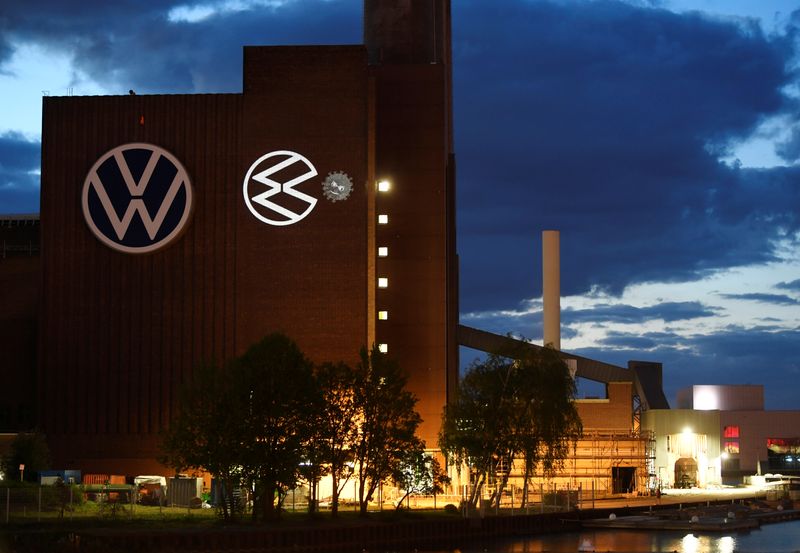FRANKFURT (Reuters) - Volkswagen (DE:VOWG_p) will restart production at its Wolfsburg factory in Germany on Monday, the latest of a fleet of European carmakers to take advantage of eased coronavirus lockdown rules to resume manufacturing.
VW, the world's largest car manufacturer, is celebrating the reopening of its biggest plant, in Wolfsburg, by projecting a cartoon of a VW logo squashing coronaviruses.
Encouraged by a fall in infection rates, Germany has allowed small retail stores to reopen, provided they adhere to strict distancing and hygiene rules. Now large corporations are following suit.
BMW (DE:BMWG), Daimler (DE:DAIGn) and VW are banking on Germany’s ability to trace and contain the new coronavirus, and a healthcare system capable of extensive testing to identify possible carriers of the disease.
This stands in stark contrast to the United States, where the head of the United Auto Workers union said on Thursday it was "too soon and too risky" to reopen auto plants in early May, citing insufficient coronavirus testing.
European factories have changed work patterns, to incorporate more rigorous hygiene and cleaning intervals as well as more generous spacing between workers.
As part of Volkswagen's cartoon, the VW logo celebrates with a "thumbs-up" after defeating the virus.
"On Monday, the German auto industry is back. We at Volkswagen have used the five-week pause to prepare ourselves for restarting production," said VW works council chief Bernd Osterloh.
BMW says it is cranking up engine manufacturing starting this Monday. BMW wants to reopen its British plant in Goodwood and its Spartanburg, South Carolina on May 4, followed by Dingolfing, Germany and San Luis Potosi in Mexico on May 11, depending on market demand, the carmaker said.
Other plants in Leipzig, Regensburg, and Rosslyn South Africa will open after May 18, starting with a one-shift system the carmaker said. BMW's factory in Shenyang, China has been producing since Feb. 17.
Workers need to wear masks and keep a distance to one another. The seating order on BMW factory buses has been changed, as has the process for entering and exiting the bus.
Workers need to come to the plant already wearing their factory clothes, to avoid time stuck in changing rooms, and designated pathways in the plant have been altered to ensure there is "one-way" traffic only, BMW said.
Mercedes-Benz plants in Sindelfingen and Bremen are also making preparations to ramp up production.
Unlike Italy and Spain, Germany never banned car production, though factories came to a standstill after authorities restricted the movement of people and ordered the closure of car dealerships, hitting demand.
FiatChrysler will open its Sevel plant in central Italy on Monday, with plans to resume production at a rate of between 70%-80%.
In France, Toyota this week restarted an assembly plant in Valenciennes and Renault (PA:RENA) began producing engines at its factory in Cleon, west of Paris. It will be followed by Renault’s Flins plant, west of Paris, where only 25% of the workforce is due to resume work.
Sweden’s Volvo Cars reopened its Torslanda factory this week after overhauling its production processes.

"The economy has come to a halt in Europe. A vaccine will take a long long time. It is important to restart in a safe way. Hopefully we can contribute to a normalization,” Volvo cars Chief Executive Hakan Samuelsson told Reuters.